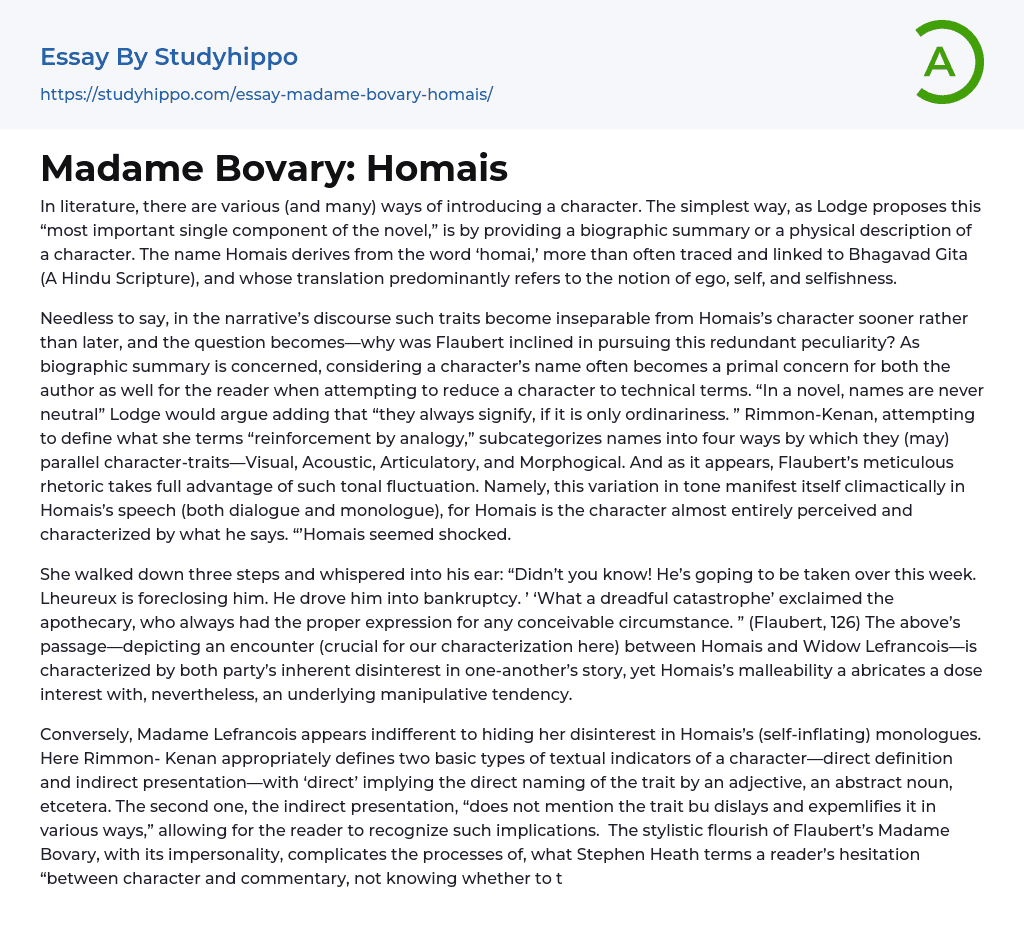Various methods are used in literature to introduce a character. According to Lodge, one simple way is to give a biographic summary or physical description. The name Homais is derived from the word 'homai,' which is often associated with the Bhagavad Gita, a Hindu scripture. Its translation mostly relates to ego, self, and selfishness.
In the narrative discourse, Homais's traits merge with his character quickly, and it raises the question of why Flaubert emphasized this redundancy. When it comes to biographical summaries, naming a character becomes a crucial concern for both the author and the reader as they try to define a character in technical terms. According to Lodge, names in novels are never neutral, always signifying something, even if it's just ordinariness. Rimmon-Kenan categorizes names into four types of traits they may parallel - Visual, Acoustic, Articulatory, and Mor
...phogical. Flaubert's meticulous rhetoric effectively utilizes these tonal variations. Specifically, this fluctuation in tone climaxes in Homais's speech, both in dialogue and monologue, as he is primarily perceived and characterized by what he says. "Homais seemed shocked.
She descended three steps and whispered in his ear: “Did you not know? He will be taken over this week. Lheureux is foreclosing on him. He drove him into bankruptcy.’ ‘What a terrible disaster,’ exclaimed the apothecary, who always had the appropriate expression for any imaginable circumstance.” (Flaubert, 126) The passage above, which shows an important encounter between Homais and Widow Lefrancois (crucial for our characterization here), is characterized by the lack of interest both parties have in each other's stories. However, Homais's adaptability fabricates a certain interest with a manipulative tendency hidden beneath it.
<
style="text-align: justify">
On the other hand, Madame Lefrancois does not seem to care about hiding her lack of interest in Homais's (self-inflating) monologues. In Rimmon-Kenan's analysis, she distinguishes between two types of textual indicators for character portrayal: direct definition and indirect presentation. 'Direct' refers to the explicit naming of a trait using adjectives or abstract nouns. On the other hand, indirect presentation does not directly mention the trait but instead demonstrates and exemplifies it in different ways, allowing readers to infer such implications. The stylistic complexity of Flaubert's Madame Bovary, characterized by impersonality, complicates the reader's ability to distinguish between character and commentary. Stephen Heath refers to this as a reader's hesitation, unsure whether to take what is said about a character at face value. In his chapter on "Showing and Telling," Lodge vividly illustrates and identifies Flaubert's approach to characterization.
The apothecary, Homais, is portrayed as someone who always has the right words for any situation. This emphasizes the author's authority and makes us see the character in a very detailed way. However, there is a bit of repetition in restating Homais's obvious trait, which raises the question of why it is necessary to do so.
Lodge identifies this as a tool used to "accelerate the tempo of a narrative, hurrying us through events which would be uninteresting, or to interesting - therefore distracting, if lingered over" (Flaubert, 324). In evaluating Homais's importance to the novel's theme (besides the plot), we reach the conclusive moment: he has a vast clientele, is supported by authorities and public opinion, and has recently received the Legion of Honor. This ironic and critical conclusion highlights the presence
of social pressures that shape Homais's character. Homais, although not a central figure in the plot, represents the harsh reality imposed by Madame Bovary's underlying themes and acts as a mediator. However, Homais is more than just a mediator; he manipulates minds and subtly influences others' perceptions by using every possible medium to spread his own biases.
Despite being destructive, Homais is significant in the novel as he mediates by using irony to supply the novel and its characters. He manipulates Charles into taking Emma to the opera in Rouen, which triggers Emma's affair with Leon and leads to a sequence of detrimental events. This makes Homais essential to the plot as his negative influence on Emma's character shapes her path towards deterioration.
The combination of various factors, including Homais's name, his rhetorical style characterized by redundancy and demagogy, and Flaubert's need to emphasize it all with direct definition, results in the creation of a character who represents a wide range of social pressures, ultimately concluding the novel in a kaleidoscopic manner.
- Nightclub essays
- Nineteen Eighty-Four essays
- Maus essays
- John Locke essays
- 9/11 essays
- A Good Teacher essays
- A Healthy Diet essays
- A Modest Proposal essays
- A&P essays
- Academic Achievement essays
- Achievement essays
- Achieving goals essays
- Admission essays
- Advantages And Disadvantages Of Internet essays
- Alcoholic drinks essays
- Ammonia essays
- Analytical essays
- Ancient Olympic Games essays
- APA essays
- Arabian Peninsula essays
- Argument essays
- Argumentative essays
- Art essays
- Atlantic Ocean essays
- Auto-ethnography essays
- Autobiography essays
- Ballad essays
- Batman essays
- Binge Eating essays
- Black Power Movement essays
- Blogger essays
- Body Mass Index essays
- Book I Want a Wife essays
- Boycott essays
- Breastfeeding essays
- Bulimia Nervosa essays
- Business essays
- Business Process essays
- Canterbury essays
- Carbonate essays
- Catalina de Erauso essays
- Cause and Effect essays
- Cesar Chavez essays
- Character Analysis essays
- Chemical Compound essays
- Chemical Element essays
- Chemical Substance essays
- Cherokee essays
- Cherry essays
- Childhood Obesity essays




